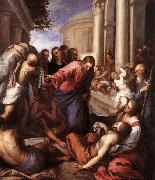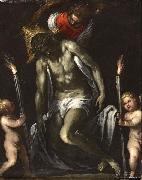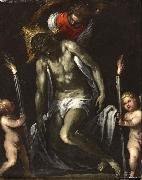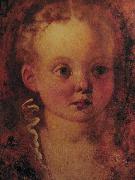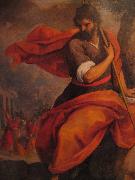PALMA GIOVANE Huiler la Reproduction de TableauAll PALMA GIOVANE Oil PaintingsItalian Mannerist Painter, ca.1548-1628 |
|||

|
|||
|
|
|||
|
||||||||||||
| PALMA GIOVANE Italian Mannerist Painter, ca.1548-1628 |
||||||||||||
|
|
||||||||||||
| ID de tableau:: 63830 The Pool The Pool 1592 Oil on canvas Collezione Molinari Pradelli, Castenaso St John's version (John 5:1-15) of the miracle of the healing of the paralytic lays the scene in Jerusalem at the pool of Bethesda. (According to Matthew, Mark and Luke it took place at Kapernaum.) The place was a resort of the sick since the waters were believed to have miraculous curative powers. It was said that from time to time an angel, traditionally the archangel Gabriel, came and disturbed the water and that the first person to enter it afterwards was healed. But the paralytic had never succeeded in being first. Christ came there and found him. He was ordered to take up his bed and walk and immediately found himself cured. John described it as 'a place with five colonnades', and therefore represented with some such architectural feature. Christ addressing the paralytic who lies at the edge of the pool. Others, sick and infirm crowd the scene. Palma's painting was clearly inspired by the great examples of sixteenth-century Venetian art and in particular by the works of Tintoretto. The composition is typical of Palma the Younger's mature style. Compositional flair, the employment of diagonal perspectives and rich colours almost obliterated by heavy shadow as well as the theatrical eloquence of the gestures and use of foreshortening are all typical characteristics of Palma the Younger's style of painting. When he managed to control all of them, as in this splendid example, he took post-Renaissance Venetian painting, generally considered a dismal period in art, to its highest degree of effectiveness and expression. When, on the other hand, the effects he used degenerated into repetitive formulas, seventeenth-century Venetian art very quickly became monotonous. This painting is a part of the Collezione Molinari Pradelli, the most extensive private collection of seventeenth- and eighteenth-century art in Italy.Artist:PALMA GIOVANE Title: The Pool Painted in 1551-1600 , Italian - - painting : religious 1592 Oil on canvas Collezione Molinari Pradelli, Castenaso St John's version (John 5:1-15) of the miracle of the healing of the paralytic lays the scene in Jerusalem at the pool of Bethesda. (According to Matthew, Mark and Luke it took place at Kapernaum.) The place was a resort of the sick since the waters were believed to have miraculous curative powers. It was said that from time to time an angel, traditionally the archangel Gabriel, came and disturbed the water and that the first person to enter it afterwards was healed. But the paralytic had never succeeded in being first. Christ came there and found him. He was ordered to take up his bed and walk and immediately found himself cured. John described it as 'a place with five colonnades', and therefore represented with some such architectural feature. Christ addressing the paralytic who lies at the edge of the pool. Others, sick and infirm crowd the scene. Palma's painting was clearly inspired by the great examples of sixteenth-century Venetian art and in particular by the works of Tintoretto. The composition is typical of Palma the Younger's mature style. Compositional flair, the employment of diagonal perspectives and rich colours almost obliterated by heavy shadow as well as the theatrical eloquence of the gestures and use of foreshortening are all typical characteristics of Palma the Younger's style of painting. When he managed to control all of them, as in this splendid example, he took post-Renaissance Venetian painting, generally considered a dismal period in art, to its highest degree of effectiveness and expression. When, on the other hand, the effects he used degenerated into repetitive formulas, seventeenth-century Venetian art very quickly became monotonous. This painting is a part of the Collezione Molinari Pradelli, the most extensive private collection of seventeenth- and eighteenth-century art in Italy.Artist:PALMA GIOVANE Title: The Pool Painted in 1551-1600 , Italian - - painting : religious |
||||||||||||
|
|
||||||||||||
| ID de tableau:: 80261 Christ supported by two cherubs supporting a Cero Christ supported by two cherubs supporting a Cero Info from source: Jacopo Negretti, called " PALMA IL GIOVANE " (1548 Venice 1628), Christ supported by two putti each supporting a Cero, oil on slate, 31 x 25.5 cm author died 1628 cjr Info from source: Jacopo Negretti, called " PALMA IL GIOVANE " (1548 Venice 1628), Christ supported by two putti each supporting a Cero, oil on slate, 31 x 25.5 cm author died 1628 cjr |
||||||||||||
|
|
||||||||||||
| ID de tableau:: 84498 PALMA GIOVANE PALMA GIOVANE oil on slate, 31 x 25.5 cm Date Unknown; author died 1628 cyf oil on slate, 31 x 25.5 cm Date Unknown; author died 1628 cyf |
||||||||||||
|
|
||||||||||||
| ID de tableau:: 86833 Bimba a mezzo busto Bimba a mezzo busto Oil on cardboard Dimensions Italiano: 38 x 28 cm cyf Oil on cardboard Dimensions Italiano: 38 x 28 cm cyf |
||||||||||||
|
|
||||||||||||
| ID de tableau:: 96701 San Giacomo Minore San Giacomo Minore oil on canvas Dimensions 158 X 115 cm cyf oil on canvas Dimensions 158 X 115 cm cyf |
||||||||||||
|
|
||||||||||||
| Artiste précédent Artiste prochain | ||||||||||||
|
|
||||||||||||
|
PALMA GIOVANE Italian Mannerist Painter, ca.1548-1628 |
||||||||||||
|
|
||||||||||||
|
CONTACTER DES Etats-Unis |





